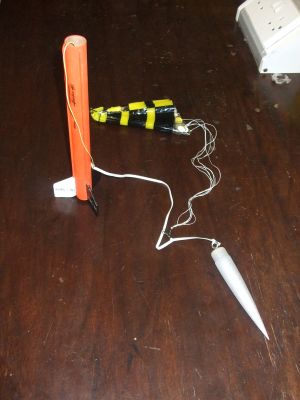| Construction Rating: | starstarstarstarstar |
| Flight Rating: | starstarstarstarstar |
| Overall Rating: | starstarstarstarstar |
| Diameter: | 0.83 inches |
| Length: | 14.00 inches |
| Manufacturer: | Semroc  |
| Skill Level: | 1 |
| Style: | Scale |

Brief:
As my first attempt at constructing a real scale rocket, I chose the Aerobee Hi for my entry in the 2008 EMRR
Challenge. The Aerobee Hi rocket is of a simple design and so looked like a mountable challenge. Being the first mass
produced rocket kit, it also has some history behind it and would be easy to fly on a small motor.
The Aerobee Hi consists of a simple single stage rocket with a parachute recovery system. A three fin design with strakes running from fins to the nose cone.
Construction:
Parts list:
- Body Tube, BT-40W
- Body Tube, ST-730
- Balsa Nose Cone, BNC-40G
- 3 x Laser Cut Fins, FV-2
- Thrust Ring, TR-7
- Launch Lug, LL-110
- Screw Eye, SE-10
- Elastic Cord, EC-118
- Kevlar® Thread, SCK-18
- Plastic Parachute RC-12
- 6 x Tape Discs, TD-6
- Shroud Line, SLT-6
- Decals, DKV-2

Also used:
- PVA Glue
- Bostik Glue
- Sandpaper
- Orange Paint
- Black Paint
- White Paint
- Silver Spray Paint
The instructions provided with the kit were extremely easy to follow with a logical order and some small tips to increase the rocket's performance. Illustrations for each step reinforced the meaning of any ambiguous instructions. The only problem being with the direction in which the shock cord should be inserted into the body tube, however, that did not matter in the final stages as all that was required was a small ruler to push it through the correct end. Inclusion of the fin guide made fin alignment very easy and the strake design helped maintain the correct fin positions.
Once completed the rocket, although light, felt extremely strong and sturdy which gave an impression of a good quality rocket kit.
Finishing:
The finishing itself was straightforward with the main body being painted orange, two of the fins white, and the
final fin black. The nose cone was sprayed silver which required the top and bottom halves to be sprayed separately due
to the awkwardness of holding the cone whilst spraying. The orange paint for the body required a few layers due to the
light nature of the color but gave no problems.
Construction Rating: 5 out of 5

Flight and Recovery:
My first three flights were all performed the same day with almost no wind.
For my first flight I used an A8-3, which is not one recommended by the instructions but of similar ratings. The takeoff was fast due to the lightweight nature of the rocket and a good height was reached. The nose cone was ejected just before apogee but to no detrimental effect. Deployment of the parachute was successful and the rocket landed not 100 meters from the launch site.
Due to the enormous success of the first launch I then used the same motor for my second. Again a fast takeoff, but the ejection charge caused the motor to be ejected rather than the nose cone and parachute. The rocket fell back to earth nose cone first and hit at considerable speed. However, minimal damage was sustained with just a small dent in the balsa where the body tube had dug in. The strakes on the side of the rocket proved very useful here as they gave enough strength to the rocket to prevent any buckling of the main body tube.
For the third flight, I used a B6-6 engine to obtain a greater height. I replaced the parachute with a streamer to prevent the rocket from drifting too far in the slight gusts of wind. This time takeoff was very fast and it almost disappeared out of sight. The nose cone ejection was successful and a smooth landing followed with no damage despite a fairly rapid descent.

Flight Rating: 5 out of 5
Summary:
The main PROs of the Aerobee Hi are its easy of build and its sturdiness in flight which reduce the chance of damage
and lead to a very reliable rocket. Overall there are no problems. However, if flying on an engine greater than an A, I
would recommend replacing the parachute with a streamer to reduce the risk of loss if flying near trees and as the
impact will have no effect on the rocket's composition.
Overall Rating: 5 out of 5
Other Reviews
- Semroc Aerobee-Hi By Chan Stevens (April 19, 2008)
The Aerobee-Hi was the first production model offered my Model Missiles Inc. (MMI), and was introduced just about 50 years ago from the time this review is likely to be posted. The original version featured a maple nose cone, parallel-wound tubes, and sold for $7.95. 50 years later, Semroc has gone with balsa nose cone, upgraded to laser-cut fins and Kevlar shock cord, while keeping the price ...
 |
 |
Flights
 |
 |
Sponsored Ads
 |
 |












B.W.P. (May 6, 2008)